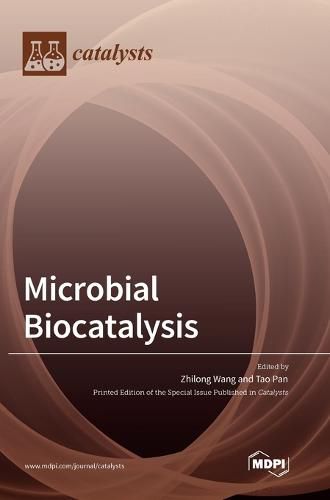Readings Newsletter
Become a Readings Member to make your shopping experience even easier.
Sign in or sign up for free!
You’re not far away from qualifying for FREE standard shipping within Australia
You’ve qualified for FREE standard shipping within Australia
The cart is loading…






This title is printed to order. This book may have been self-published. If so, we cannot guarantee the quality of the content. In the main most books will have gone through the editing process however some may not. We therefore suggest that you be aware of this before ordering this book. If in doubt check either the author or publisher’s details as we are unable to accept any returns unless they are faulty. Please contact us if you have any questions.
Biocatalysis is a sustainable alternative for the chemical industry in manufacturing, monitoring, and waste management. Biocatalytic processes perform with isolated enzymes or whole cells as biocatalysts. Whole-cell biocatalysts offer some unique advantages of cascade reactions catalyzed by multienzymes as well as a single bioredox reaction with cofactor regeneration in a single strain. Therefore, whole-cell biocatalysts are widely applied for biosynthesis/biotransformation to produce value-added chemicals as well as the complete mineralization of organic pollutants.
Biological catalytic processing using whole-cell biocatalysts includes biocatalyst engineering, bio-reaction engineering, and downstream processing. In addition to the traditional screening of microbial strains and immobilized whole-cell biocatalysts, modern genetic engineering, metabolic engineering, and synthetic biology make tailored whole-cell biocatalysts possible. At the same time, some integrated processes have successfully been applied in the catalytic processing using living whole-cell biocatalysts, such as harnessing biocompatible chemistry to interface with the microbial metabolism as well as using various separation techniques for in situ product removal.
This reprint on "Microbial Biocatalysis" provides a comprehensive overview of the recent developments of catalyst discovery, catalyst modification, and process intensification for whole cell catalysis in fermentation, biotransformation or biodegradation processes.
$9.00 standard shipping within Australia
FREE standard shipping within Australia for orders over $100.00
Express & International shipping calculated at checkout
This title is printed to order. This book may have been self-published. If so, we cannot guarantee the quality of the content. In the main most books will have gone through the editing process however some may not. We therefore suggest that you be aware of this before ordering this book. If in doubt check either the author or publisher’s details as we are unable to accept any returns unless they are faulty. Please contact us if you have any questions.
Biocatalysis is a sustainable alternative for the chemical industry in manufacturing, monitoring, and waste management. Biocatalytic processes perform with isolated enzymes or whole cells as biocatalysts. Whole-cell biocatalysts offer some unique advantages of cascade reactions catalyzed by multienzymes as well as a single bioredox reaction with cofactor regeneration in a single strain. Therefore, whole-cell biocatalysts are widely applied for biosynthesis/biotransformation to produce value-added chemicals as well as the complete mineralization of organic pollutants.
Biological catalytic processing using whole-cell biocatalysts includes biocatalyst engineering, bio-reaction engineering, and downstream processing. In addition to the traditional screening of microbial strains and immobilized whole-cell biocatalysts, modern genetic engineering, metabolic engineering, and synthetic biology make tailored whole-cell biocatalysts possible. At the same time, some integrated processes have successfully been applied in the catalytic processing using living whole-cell biocatalysts, such as harnessing biocompatible chemistry to interface with the microbial metabolism as well as using various separation techniques for in situ product removal.
This reprint on "Microbial Biocatalysis" provides a comprehensive overview of the recent developments of catalyst discovery, catalyst modification, and process intensification for whole cell catalysis in fermentation, biotransformation or biodegradation processes.